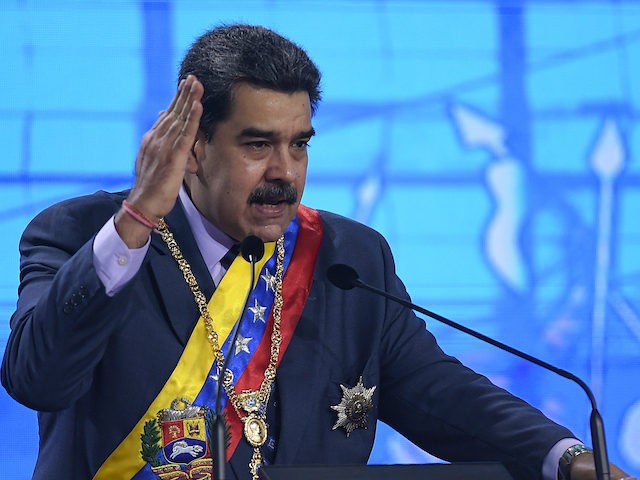Venezuelan socialist dictator Nicolás Maduro announced on Monday that the head of his National Assembly, Jorge Rodríguez, had recently met with representatives of President Joe Biden to “continue conversations initiated in March,” without elaborating.
Biden sent a delegation to Caracas this month, breaking the silence between Washington, which formally recognizes President Juan Guaidó as the legitimate leader of the country, and the brutal Maduro regime.
While Maduro did not specify the contents of that conversation, reports at the time indicated that Biden sought to discuss potentially importing Venezuelan oil into America to offset the refusal of Western nations to purchase Russian oil. As the Maduro regime is a client entity of Russia’s and is heavily indebted to Moscow, any money paid to Caracas for oil would likely end up in Russian hands.
Neither Maduro nor the White House revealed the contents of the alleged meeting between Maduro officials and the Biden delegation on Monday. Reports differ in indicating that the topics discussed were the ongoing imprisonment of American citizens in Venezuela and potential commercial cooperation.
“I am in communication with Jorge Rodríguez. He is currently receiving a delegation from the U.S.,” Maduro announced on a state television broadcast on Monday evening. “An important delegation from the government of the U.S. that has arrived in Venezuela two hours ago. And he is working to continue communications initiated on March 5 and to continue the bilateral agenda.”
#EnVideo📹| Jefe de Estado, @NicolasMaduro anunció que una delegación de EE. UU. arribó a Venezuela, lo que estará dandole continuidad a la agenda bilateral entre ambos gobiernos.#ComunicadoresDeLaPatria pic.twitter.com/1KdLnJV00P
— VTV CANAL 8 (@VTVcanal8) June 28, 2022
Neither the White House nor the State Department have published any official readouts or releases regarding the alleged meeting in Caracas.
Neither the White House nor the State Department have published any official readouts or releases regarding the alleged meeting in Caracas. Anonymous sources allegedly tied to the White House told Reuters, however, that the two American officials participating were Ambassador James Story, the top Venezuela relations diplomat in Colombia, and “chief hostage negotiator” Roger Carstens.
“Sources familiar with the matter said the agenda for Monday’s talks was limited to humanitarian issues and did not include the OPEC nation’s oil sector, which has been under U.S. sanctions since 2019,” Reuters added, also citing a statement from a State Department spokesperson.
Reuters additionally reported that the Americans met with Guaidó. Guaidó has not at press time commented on the visit.
Biden has made little material effort to support Guaidó – who, despite legally and constitutionally being the president of Venezuela, has no power to exercise because Maduro retains control of the nation’s armed forces and police.
The Biden administration has continued the tradition under President Donald Trump of making superficial gestures of support to Guaidó, however. Last week, for example, First Lady Jill Biden received Guaidó’s wife, Fabiana Rosales, in the White House.
I was honored to welcome @FabiiRosales to the White House yesterday to hear her story as an advocate for vulnerable Venezuelans.
She is a courageous First Lady and mother fighting for a better future for all Venezuelans. pic.twitter.com/JsyClGFDcW
— Jill Biden (@FLOTUS) June 23, 2022
While the visit did not appear to address Venezuela’s oil industry – whose production has plummeted to pre-1947 levels under socialist mismanagement despite the country being home to the world’s second-largest oil reserves – Maduro did address his struggle to sell Venezuelan oil under American sanctions during his remarks on Monday.
“They have persecuted us, they have hurt us,” Maduro said of the “West” generally regarding the country’s oil industry. “Let them do what they want with their persecution and their sanctions. Here we will continue with our work, our production, and our results.”
A French presidential official said in remarks at the G7 Summit on Monday that the Macron administration would seek to promote the purchase of Venezuelan oil in pursuit of the “diversification of supplies.”
“There is a knot to untie if necessary (between the US and Iran)… so that Iranian oil… and Venezuelan oil can also be able to be put back on the market,” the French official reportedly said. The official did not address Venezuela’s astronomical debt to Russia, which it would likely seek to repay with oil profits.
Maduro urged Macron to invest in his dictatorship on Monday.
“President Macron, Venezuela is ready to receive all the French companies who want to come produce petroleum and gas for the European market, for the world market,” Maduro said during his television appearance. “The path is made. We are ready, willing, and able to do it.”
Macron’s call to add Venezuelan oil to the global market follows months of pressure from far-left Democrats on the Biden administration to lift sanctions on Maduro – despite Hispanic-Americans largely disagreeing with thawing relations with the Western Hemisphere’s dictatorships: Venezuela, Cuba, and Nicaragua.
A Quinnipiac University poll found this month that only 24 percent of Hispanic Americans approve of Biden’s tenure in office, significantly lower than other demographic groups. Previous polling has found significant concern among Hispanics about “Democrats embracing socialism” – a concern not tempered by warming relations with Maduro.
“He is doing this late, it is taking him so long, because it is costing him too much politically to take this action,” Rubén Chirino Leañez, the CEO of the Venezuelan polling firm Meganálisis, told Breitbart News this month regarding improving relations with Maduro. “A midterm election is coming to him at the end of the year … this is going to have an important political cost for Biden.”

COMMENTS
Please let us know if you're having issues with commenting.